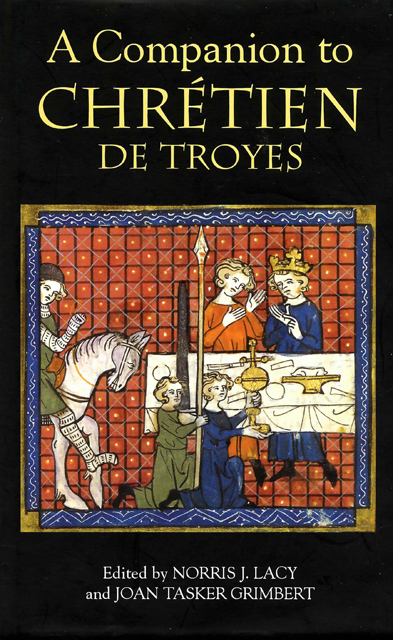1 - Chrétien in History
Published online by Cambridge University Press: 23 March 2023
Summary
A genius in creating fictional worlds, Chrétien was remarkably insulated from his own historical context. Even his name presents a problem. Was he from Troyes in Champagne as he asserts in his first romance, Erec et Enide (vs. 9) – and this was probably the case – or was his name an ironic oxymoron, a Christian from the pagan Greek city of Troy from which the Frankish peoples claimed their mythological descent, in imitation of Vergil's account of the origins of the Romans? His five canonical romances are relatively free of markers of place and time that point outside the text. Only Cligés, his second romance, unfolds in a contemporary geographic setting. The story shifts back and forth between the eastern Greek empire designated by the cities of Athens and Constantinople and King Arthur's realm in England, punctuated by the sites of London, Windsor and Oxford-Wallingford. The ports of entry and departure are appropriately Southampton and Shoreham on the Sussex coast. The German empire occupies a middle space, designated by the cities of Regensburg and Cologne. The action in Erec et Enide, however, is limited to the Celtic fringe signified by Cardigan in Wales, York and Tenebroc on the Scottish borders and Nantes in Brittany, but without connecting itineraries or the crossing of seas. Space in the three remaining romances is Arthurian and mythological of Chrétien's invention. Lancelot and Perceval feature the fictive kingdom of Logres and romantic place names such as Noauz and Beaurepaire. Yvain and Perceval purport to take place in Wales. Caerleon, where Arthur stays, is actually in Wales, but the place name ‘Carduel’, which Chrétien specifies as Arthur's chief seat in Wales in Yvain and Perceval, may be a confusion for Cardigan in Wales, but it is the normal spelling in French for Carlisle on the borders of Scotland. Other identifiable places occur in connection with minor characters; such as a certain David and a Tiebaut of Tintagel; or allusions to valued products known from their place of origin, as, for example, silks from Thessaly, Constantinople and Alexandria and horses from Gascony, Arabia, Spain and especially Norway. Except for Cligés, time is invariably marked by the calendar of the great ecclesiastical feasts, particularly Pentecost, when the weather usually promises to be fine. The feast of the birth of St John the Baptist (24 June) figures prominently in Yvain, where deadlines govern the plot.
- Type
- Chapter
- Information
- A Companion to Chrétien de Troyes , pp. 3 - 14Publisher: Boydell & BrewerPrint publication year: 2005
- 11
- Cited by

